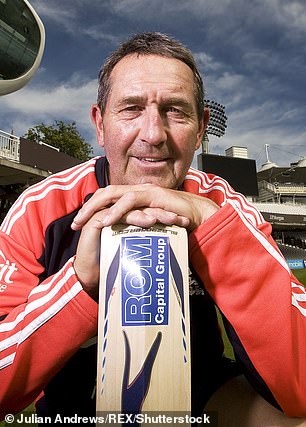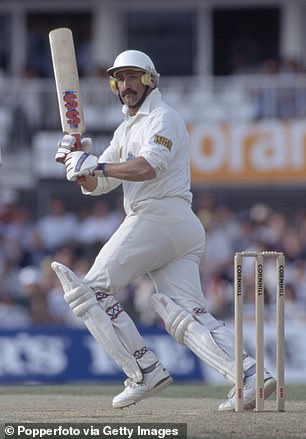Great success: Graham Gooch in action for England against South Africa at The Oval in 1994
Former Essex and England cricket captain Graham Gooch, 70, scored more than 67,000 runs, including 333 against India at Lord’s in 1990, says Dan Moore.
Graham has since combined his work as a cricket commentator and dinner speaker with a successful career as a coach and selector with Essex County Cricket Club.
He founded the Graham Gooch Scholarship Fund, which supports the next generation of cricketers through its association with the Essex Cricket Academy.
Graham, a divorced father of three, lives in Essex with his partner, Julia.
What did your parents teach you about money?
My parents weren’t very rich. The most important financial lesson I remember was when I was a teenager and my father lent me £60 to buy my first car, and he made sure I paid it back.
Apart from cricket, what was your first job?
Before I played cricket, my father insisted that I do a four-year apprenticeship in engineering. He said it would be something to fall back on. I was paid £10 a week. I signed as a professional for Essex in 1974, the day I qualified.
Were you careful with your money?
Yes. When I signed up with Essex I started putting money into a building society account. In 1976 I got married and the savings helped me buy our first house for £10,500. It was a three-bedroom terraced house from the 1920s. This paid off because in the late 1970s house prices soared.
How did you become a professional cricketer?
When I was 13, my father took me to Ilford Cricket School for a coaching course. I met the resident coach, former Essex player Bill Morris, and he turned my talent into something useful. I was determined to go to a bigger club, Waltham Forest, but Bill persuaded me to stay at Ilford. I made my debut for the second team at 15, and then my father insisted I do an apprenticeship. I played for the Essex under-19 team when I wasn’t working.
How much did you earn when you signed as a professional?
In those days, cricketers had six-month contracts, from April to September. I was paid £1,074 a season. Since I lived at home, that was enough to ensure that I could never work in engineering full-time. But when the season was over, in the winter of 1974-75 I worked for Goldring in Leytonstone making transcription units – the fancy name for record players.
Did playing for England have an impact on your finances?
Not at first. The game against Australia at Edgbaston in 1975 was my first international game. I was given £200, plus hotel room and expenses.
When did match rates start to improve?
It all changed in 1977 with Kerry Packer’s World Series in Australia. He wanted the television rights for Channel 9, but the Australian Cricket Board refused. So he sided with the players who were complaining about the organisers. They were getting 90,000 spectators at the Melbourne Cricket Ground, but the players were paid $250 a match. Packer changed everything: coloured clothing, white balls, franchise cricket. Now the average player is a millionaire, and it all started there. When I returned to the England team after a three-year ban for playing on the South Africa Rebel Tour in 1982, the fee was something like £1,000 a Test match.

Hot streak: When Graham was England’s batting coach
What was the best year of your financial life?
That would be in 2012, when he was England’s batting coach.
Have you ever been paid a ridiculous amount of money for a one-off piece of work?
I do a lot of after-dinner talks, and while it is lucrative, I have unfortunately never had a one-off job that paid hundreds of thousands of dollars.
What’s the most expensive thing you’ve ever bought for fun?
I just bought an MG RV8 for £25,000. I had one 30 years ago but sold it when my children were born.
What were your best and worst financial decisions?
I’ve done well with houses – I’ve fixed them up and sold them for a profit. As for the worst, nothing too drastic, but when my first wife, Brenda, and I divorced, I lived in a three-bedroom house. I sold it to help finance the house we live in now. I shouldn’t have done that.
Are you a spender or a saver? Do you have a pension?
I don’t mind spending, but I’m cautious about investments. We have pensions, nothing risky. I have a SIPP and an annuity.
How many properties do you own?
Julia and I have an old gatehouse that I bought 29 years ago. I also have a cottage in Norfolk. We had a house in Portugal, but we sold it.
What is your number one financial priority?
Probably to find a way to stop working altogether.
What’s next for you in the workplace?
I am busy with personal development dinners and talks, all about how to get the best out of yourself. I am also an ambassador for Essex County Cricket Club and run my scholarship fund with Julia, raising money for cricket projects in East London, Essex and East Anglia.
- Visit essexcricket.org.uk for more information on the Graham Gooch Scholarship Fund. To book Graham to speak at an event, contact nmplive.co.uk.
Some links in this article may be affiliate links. If you click on them we may earn a small commission. This helps us fund This Is Money and keep it free to use. We do not write articles to promote products. We do not allow any commercial relationships to affect our editorial independence.

